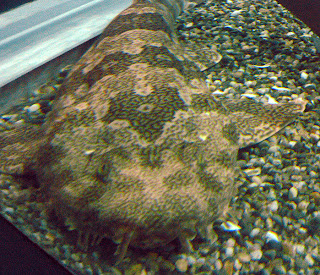Short URL for the story : http://goo.gl/UAxgS
Sharks are one of the most dreaded organisms under water. The
killer label has made them a nightmare for divers all along the globe. However,
a recent study reveals crucial information about the vision of sharks which can
help avert fatal encounters with sharks under water.
 |
| Ornate Wobbegong (
Orectolobus ornatus) Image Courtesy: Peter Halasz |
In the study which was published in the Biology Letters, a
team of researchers explains the peculiar vision system in sharks. Existing knowledge
about sharks’ way of looking at things reveals that they are most likely to be color
bind. However, the new study confirms this understanding and exposes the reason
behind.
The single con cell
aka looking at a grey world
The study has analyzed the cone monochromy in two species of
carpet sharks (the spotted wobbegong Orectolobus maculatus and the
ornate wobbegong O. ornatus) at molecular level. Cones are special
type of light sensitive cells inside the retina of the eye of the organism. The
cone cells are used for distinguishing fine details and different colors. They
often work well under brighter light conditions. However, the cone cells in the
eye of sharks can detect light rays from a single spectrum which makes them color
blind.
The researchers have isolated the visual opsin genes of the
two genuses of carpet sharks to search for an answer for the monochromy at
molecular level. During the analysis, the researchers have found that only two
opsin genes were present in the carpet sharks – RH1 and LWS. Among these, RH1
is related to rod cells while LWS is related to cone cells. This analysis
confirms the fact that sharks has only a single cone cell type on their retina,
which in turn explains why sharks may be looking at a grey world.
Rudimentary color
vision
Since their color vision is not functional, researchers consider
a possibility of sharks comparing the signals from the rods and con cells in
their retina at intermediate light levels. Whales actually
have similar vision mechanism. If the sharks also do so, they will
have a rudimental color vision. But researchers were unable to detect any behavioral
evidence to support this theory.
The study is a crucial one about the evolution of color
vision among vertebrates. There are very less studies on color vision in
organisms like sharks, skates and rays. It also points to the trend of convergent evolution - a phenomenon in which unrelated groups of organisms develop similar traits (here color blindness among sharks and whales).
Better understanding,
less conflicts
The study may help develop invisible fishing nets in the future
which will reduce the rate of shark death due to accidental by-catch. This is
presently is the major threat to the shark population in the world. It will
also help make less attractive wetsuits for divers which will reduce fatal
encounters with sharks.

No comments:
Post a Comment
Please feel free to have your say on our stories. Comments will be moderated. anonymous Comments will not be approved. No links in the comment body unless meant for sharing a very relevant info.